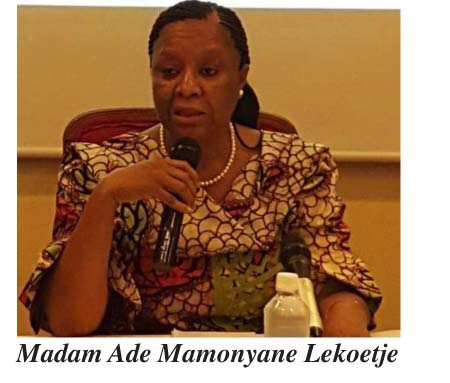
The
menace of corruption has led the UN Resident Coordinator in The Gambia to
describe corruption has the biggest threat to development.
Madam
Ade Mamonyane Lekoetje made this averring pronouncement while delivering a
statement yesterday at the opening ceremony of a three-day stakeholder workshop
on ‘The Gambian Anti–Corruption Bill’ held at the Kairaba Beach Hotel.
“Corruption
is undoubtedly the biggest challenge to development,” the UN Resident
Coordinator said, pointing out that the dishonest practice “stifles economic
growth and diverts funds from vital public services and undermines efficiency”.
“This
reality of corruption and its devastating effects make it important for every
government, the United Nations System, development partners and every Gambian
to work to end corruption,” she said, calling on all and sundry to make
combating corruption their concern.
The
Economic Community of West African States (ECOWAS) adopted the ECOWAS Protocol
on the Fight against Corruption in 2001 but the protocol has not entered into
force due to a lack of ratifications as only 8 countries have so far ratified,
making it difficult to collectively fight corruption in the region.
And
as this snail’s pace in ratifying the ECOWAS Protocol on the Fight against
Corruption drags on, the latest ratings by Transparency International’s
Corruption Perceptions Index (CPI) show that West African countries have
“disproportionately higher levels of corruption” than countries in other
regions.
Madam
Ade Lekoetje said that, following the democratic transition in January 2017
that received support from ECOWAS and globally, The Gambia has a unique
opportunity to be the champion of anti-corruption and democracy in the region.
This
is deduced from the fact that in 2003, the African Union adopted the AU Convention
on Preventing and Combating Corruption to address corruption in the public and
private sectors, and The Gambia happens to be among the 37 African countries
that have ratified the convention to date.
Also,
in December 2005, the UN Convention against Corruption (UNCAC) came into force
and it has been ratified by 155 States, including The Gambia. The Convention
obliges States to prevent and criminalize corruption; to promote international
cooperation; to recover stolen assets generated by corruption and to improve
technical assistance and information exchange in both the private and public
sectors. “Specifically, Article 6 of the convention requires countries to
establish independent anti-corruption bodies,” the UN country representative
said.
At
the national level, she noted, efforts have been made to combat corruption
through legislations. “The Criminal Code was passed in 1979 to provide a legal
platform for fighting corruption,” she expatiated: “In 1982, the Evaluation of
Assets and Prevention of Corrupt Practices Bill was passed by the parliament
while in 2012, the Gambia Anti-Corruption Act was established to fight
corruption. The law provided for the setting up of a permanent six-member
Commission mandated to investigate and prosecute all crimes of corruption
committed by Gambians within and outside the country.”
Madam
Lekoetje said that “today, according to the 2016 Corruption Perceptions Index
reported by Transparency International, The Gambia is currently 145 out of 175
countries in the list of least corrupt nations, which is a positive trend”.
Veering
onto the Anti-Corruption Bill and the establishment of an Anti-Corruption
Commission in The Gambia, the UN Country representative said this establishment
is long overdue.
“Independent
and well financed anti-corruption agencies are known to be effective in
preventing and reducing corruption, saving countries resources that are
important for development,” she said, adding that there is more emerging
evidence on correlations between corruption and development and countries
scoring low on corruption prevalence or perceptions tend to be countries that
enjoy greater prosperity, opportunity, and individual liberty.
“But
an Anti-Corruption Commission in The Gambia will not succeed if other relevant
institutional reforms are not in place,” she noted, saying that research shows
that higher-ranked countries in the corruption perception index tend to have
higher degrees of press freedom, access to information about public
expenditure, stronger standards of integrity for public officials, respect for
human rights and independent judicial systems.
She
said further: “I am glad the new government has committed to undertake various
institutional reforms that will ultimately aid the war against corruption,
especially the freedom of information bill that is currently in the formulation
stage. The United Nations will continue to assist the government to carry out
these and other reforms.”
Substantial
reduction of corruption is pertinent in 2030 Agenda for sustainable development,
she said, adding that the new National Development Plan (NDP) for The Gambia
and the United Nations Development Assistance Framework (UNDAF 2017-2021) have
mainstreamed SDG 16 and its targets as a deliberate effort to combat corruption
in The Gambia.
In
this crusade, the UN coordinator noted, the role of the civil society and media
in the fight against corruption cannot be overemphasized. “As awareness
creation and advocacy bodies, CSOs and the media can play an important role in
creating awareness on the devastating effects of corruption and also holding
leaders accountable,” she affirmed. “For example, the radio and TV can advance
discussions on corruption during which there will be increased knowledge about
harmful effects of corruption to the country. It is therefore important to
involve the civil society and the media in all stages of the bill formulation
and other related reforms.”
Concluding,
Madam Lekoetje said the UN is fully committed to promoting government efforts
to eradicate corruption, as she congratulated the Ministry of Justice for
“working tirelessly to draft the Anti-Corruption Bill” and all development
partners for their support.


